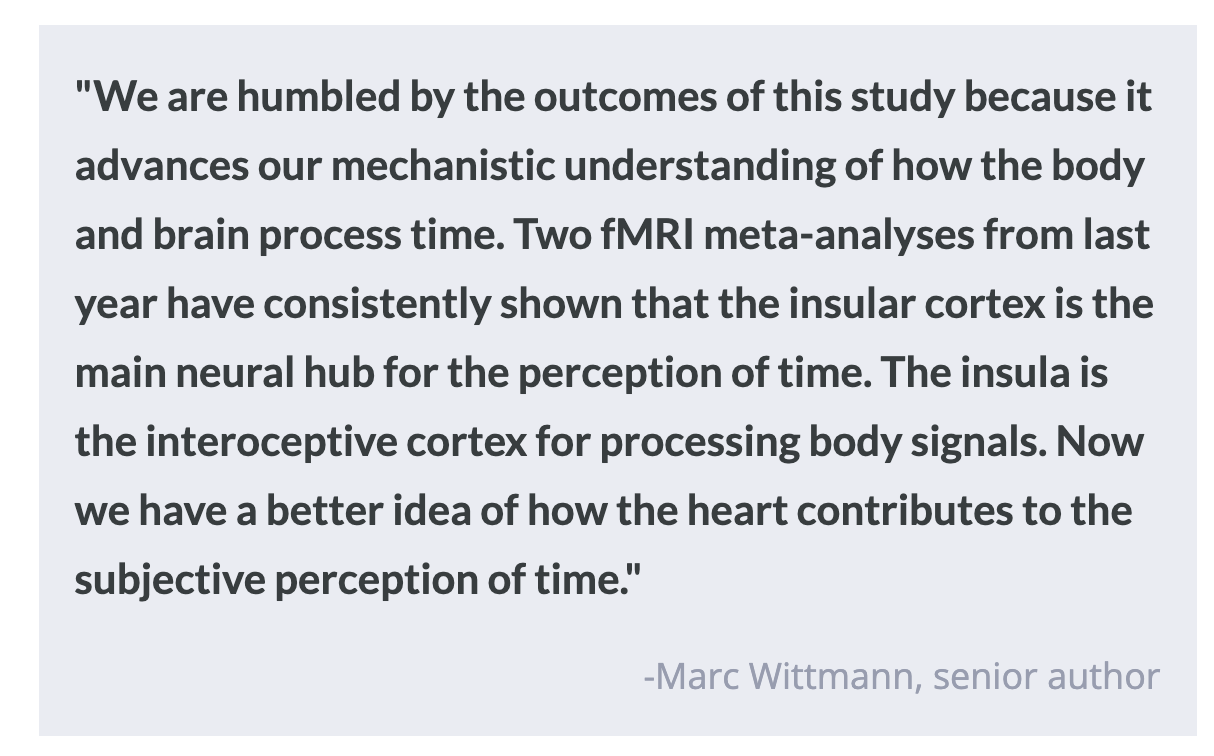Heart Rhythms and the Perception of Time
Post by Anastasia Sares
The takeaway
This study shows that our general sensitivity to internal bodily states, our ability to reproduce time intervals accurately, and the strength of heartbeat-related signals in the brain are all related—consistent with the idea that our hearts may be key to anchoring our minds in time.
What's the science?
Researchers have long known that the brain must have some sort of timekeeper or pacemaker that helps us estimate the passage of time. Increasingly, they are proposing that this timekeeper might be connected to the heart. A heartbeat influencing our perception of time is an example of embodied cognition, the concept that our mental processes are determined (at least in part) by our bodily states. A couple of papers made headlines in early 2023 showing that, on average, the beating of the heart affected moment-to-moment time estimation. However, individuals vary in their sensitivity to internal signals from their body (also known as interoception). Could this affect how good they are at estimating the passage of time and reproducing time intervals? And how exactly do the heart and the brain communicate this information?
This week in the Journal of Neuroscience, Khoshnoud and colleagues tracked the heart, the brain, and people’s conscious perception of time to understand the relationship between them during an interval-reproduction task.
How did they do it?
The authors first measured participants’ awareness of their own internal bodily states. They did this in two ways, the first being the Self-Awareness Questionnaire, where they rated their agreement with statements like: “I feel full and bloated after eating,” “I feel pain extremely,” or “I feel my heart thudding.” The second was a heartbeat counting task, where participants were asked to count their heartbeats for an indeterminate length of time without any physical aids like a finger on the wrist.
Next came the interval-timing task. In all trials, participants heard a sound that lasted either 4 seconds, 8 seconds, or 12 seconds, and when the sound ended, they had to press a button as soon as possible. Afterward, the participants had to reproduce the interval they had just heard by pressing another button 4, 8, or 12 seconds after the start of the next sound, or they did nothing. They knew ahead of time which type of trial it would be. In other words, while listening to the first sound, the only difference between trials was the knowledge that they would have to reproduce the interval later.
During the interval timing task, participants were hooked up to an electrocardiogram (measuring electrical signals from the heart) and an electroencephalogram (measuring electrical signals from the brain). Using these devices, the authors recorded the heartbeat-evoked potential, which is the brain signal occurring after a specific peak in the heartbeat (R peak). The authors also measured an electrical signal corresponding to timing in the brain called the contingent negative variation, because it is a long negative signal leading up to an anticipated event.
What did they find?
On average, participants tended to produce shorter time intervals than the ones they had been presented with. However, there was a lot of variability between individuals—for example, in the 12-second condition, people produced intervals ranging from around 7 seconds to around 13 seconds. Scores on the Self-Awareness Questionnaire, changes in heartbeat-evoked potential, and the size of the contingent negative variation were all correlated to the length of interval a person produced in the reproduction task. Better self-awareness and less dramatic changes in the neural signals correlated to longer intervals, which were typically more accurate.
While participants listened to a new interval and intended to reproduce it, the heartbeat-evoked potential slowly increased from negative to positive. The bigger the change in heartbeat-evoked potential, the shorter the interval the person produced on average. On the other hand, accuracy on the heartbeat counting task did not seem to be related to accurate time production, which conflicted with previous studies.
What's the impact?
This study adds to the evidence for embodied time cognition. It suggests that during time estimation, signals from the heart to the brain accumulate, helping us to know how much time has passed, and that this signal is calibrated differently across individuals. However, there is still a lot we don’t know about the causal chain of events and more exploration is needed in this relatively new research field.


